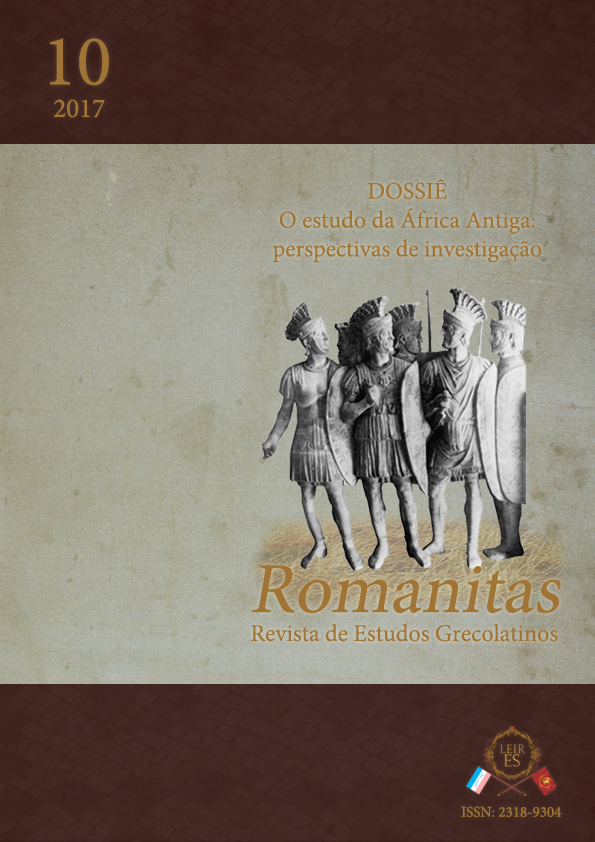Experiências monárquicas no Mundo Grego: os casos micênico e homérico
DOI:
https://doi.org/10.17648/rom.v0i10.18976Palabras clave:
Grécia, Monarquia, Período Micênico, Ánax, Basileus homéricoResumen
Apesar dos discursos provenientes do mundo da pólis relegarem a monarquia a uma tipologia de governo distante dos gregos, e reduzirem a importância desta, a verdade é que este sistema de governo se fez presente por diversos momentos durante a história política da Grécia. Nomenclaturas diferentes como, ánax, basileus, monarca ou týrannos, representam essa forma de governo que reunia nas mãos de um único homem o poder político. Neste artigo, analisaremos de forma geral duas destas monarquias, a micênica e a homérica, tendo como foco a imagem do monarca. A partir da figura do ánax e do basileus homérico, nosso principal objetivo é estabelecer um quadro comparativo entre as duas primeiras formas de realezas gregas.Descargas
Referencias
Documentação textual
ARISTÓTELES. Política. Tradução de R. L. Ferreira. Rio de Janeiro: Martins Fontes, 2006.
HOMERO. Ilíada. Tradução de H. de Campos. São Paulo: Benvirá, 2010. 2v.
______. Odisseia. Tradução de T. Vieira. São Paulo: Editora 34, 2014.
Obras de apoio
ANDRÉ, A. O culto heroico: associação entre espaço de culto e o espaço político. In: JORNADA DE ESTUDOS CLÁSSICOS PPGL/UFES, II. Anais... Universidade Federal do Espírito Santo, Vitória, p. 101-108, 2012.
BEEKES, R. Etymological dictionary of Greek. Leiden: Brill, 2010. v. 1.
BOBBIO, N. Teoria geral da política. Rio de Janeiro: Paz e Terra, 2000.
BRAIDWOOD, J. Homens pré-históricos. Brasília: Ed. UnB, 1988.
CARDOSO, C. F. S. O Egito antigo. São Paulo: Brasiliense, 1992.
______. Sete olhares sobre a antiguidade. Brasília: Ed. UnB, 1994.
CARLIER, P. Ánax and basileus in the homeric poems. In: DEGER-JALKOTZY, S.; LEMOS, I. S. (Ed.). Ancient Greece: from the Mycenaean palaces to the Age of Homer. Edinburgh: Edinburgh University Press, 2006, p. 101-110.
CHADWICK, J. El enigma micenico: el desciframento de la lineal B. Madrid: Taurus, 1973.
CHADWICK, J.; VENTRIS, M. Evidence for Greek dialect in the Mycenaean achives. Journal of Hellenic Studies, n. 73, p. 84-103, 1953.
CLASTRES, P. A sociedade contra o Estado. São Paulo: Global, 1984.
CRIELAARD, J. P. The ‘wanax to basileus model’ reconsidered: authority and ideology after the collapse of the Mycenaean palaces. In: INTERNATIONAL SYMPOSIUM IN MEMORY OF WILLIAM D. E COULSON. Acts... University of Thessaly, 2007, p. 83-111.
DICKINSON, O. The Aegean from Bronze Age to Iron Age: continuity and change between the twelfth and eighth century B.C. New York: Routledge, 2006.
DONLAN, W. The politics of generosity in Homer. Helios, n. 9, p. 1-15, 1982.
______. The pre-state community in Greece. Symbolae Osloenses, n. 64, p. 5-29, 1989.
FINKELBERG, M. Greeks and pre-Greeks: Aegean prehistory and Greek heroic tradition. Cambridge: Cambridge University Press, 2006.
FINLEY, M. I. Os gregos antigos. Lisboa: Edições 70, 1988.
GARCÍA, F. J. G. Qa-si-re-u micénico y basileús homérico: continuidad y discontinuidad en la concepción griega de la realeza. Minius, n. 10, p. 71-94, 2002.
KIRK, G. S. Los poemas de Homero. Buenos Aires: Paidós, 1985.
MARINATOS, S. N. Studies presented to David M. Robinson. St. Louis: Washington University, 1951.
MORPUGO-DAVIES, A. Terminology of power and terminology of work in Greek an Linear B. Colloquium mycenaeum, p. 87-108, 1979.
MOSSÉ, C. Alexandre, o Grande. São Paulo: Estação Liberdade, 2004.
PALAIMA, T. G. Wanaks and related power terms in Mycenaean and Later Greek. In: DEZER-JALKOTZY, S.; LEMOS, I. S. (Ed.). Anciente Greece: from the Mycenaean palaces to the Age of Homer. Edinburgh: Edinburgh University Press, 2006, p. 53-71.
PALMER, L. R. Achaeans and Indo-Europeans. L’Antiquité Classique Année, v. 24, p. 9-10, 1955.
______. The interpretation of Mycenaean Greek texts. Oxford: Clarendon Press, 1963.
______. Homerica. Transactions of the Philological Society, v. 37, p. 35-37, 1938.
QUILLER, B. The dynamics of the homeric society. Symbolae Osloenses, n. 56, p. 109-155, 1981.
RODRIGUEZ ADRADOS, F. Instituciones micenicas y sus vestigios em el Epos. In: GIL, L. (Ed.). Introducción a Homero. Madrid: Guadarrama, 1963, p. 319-333.
THEML, N. A realeza dos macedônios (VIII e VII a.C.): uma história do outro. Tese (Doutorado em História) – Programa de Pós-Graduação em História, Universidade Federal Fluminense, Rio de Janeiro, 1993.
______. As realezas em Homero: ‘géras’ e ‘time’. Phoînix, n. 1, p. 147-155, 1995.
THOMAS, C. From wanax to basileus: kingship in the Greek Dark Age. Hispania Antiqua, n. 6, p. 187-206, 1978.
VERNANT, J. As origens do pensamento grego. Rio de Janeiro: Bertrand Brasil, 2000.
VIDAL-NAQUET. P. O mundo de Homero. São Paulo: Companhia das Letras, 2002.
VLACHOS, G. C. Les societés politiques homérique. Paris: PUF, 1974.
WALCOT, P. The divinity of the Mycenaean king. Studi Micenei ed Egeo-Anatolia, n. 2, p. 53-63, 1967.
Descargas
Publicado
Número
Sección
Licencia
Derechos de autor 2018 Romanitas - Revista de Estudos Grecolatinos

Esta obra está bajo una licencia internacional Creative Commons Atribución-NoComercial-SinDerivadas 4.0.
a. Los autores conservan los derechos de autor y otorgan a la revista el derecho de publicar primero.
c. Los autores están autorizados a asumir contratos adicionales por separado, para la distribución no exclusiva de la versión del trabajo publicado en esta revista (por ejemplo, publicación en repositorio institucional o como capítulo de libro), con reconocimiento de autoría y publicación inicial en esta revista.
c. Se permite y se estimula a los autores a publicar y distribuir su trabajo online (por ejemplo, en repositorios institucionales o en su página personal) después de la primera publicación de la revista, con los debidos créditos. Atribución-No Comercial-No Derivadas
d. Los textos de la revista tienen licencia bajo CC BY 4.0 Deed Atribución 4.0 Internacional (CC BY).




























